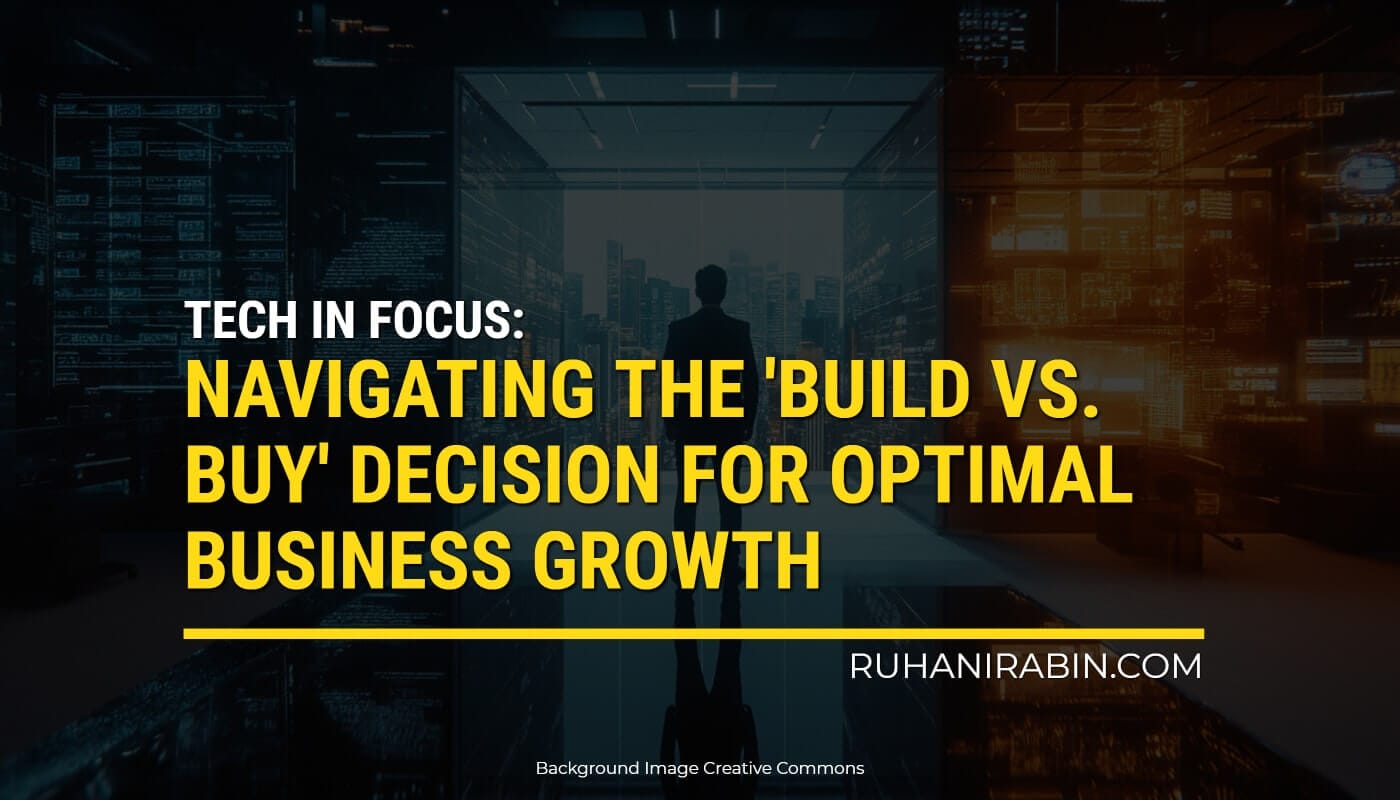Tech in Focus: Navigating the ‘Build vs. Buy’ Decision for Optimal Business Growth
Discover the pros and cons of building custom software vs. buying off-the-shelf solutions. Learn how to make the best choice for your business and navigate the ‘build vs. buy’ decision for optimal growth.

This year, the enterprise software market is projected to reach $295.20 billion. For modern businesses, software is the core of operations and strategy. As enterprises rely increasingly on technology for a competitive advantage, the decision to build your solutions or buy off the shelf carries more weight.
What are the considerations and risks? Which is the better choice for your business? Let’s explore the pros and cons to empower you to make the right decision.
Get the Best Updates on SaaS, Tech, and AI
Why Build Custom Software?

Custom software is a software solution designed for a specific organization or user. It’s tailor-made to address unique business needs or market gaps that existing solutions can’t. The options for custom solutions run the gamut from customer relationship management for sales teams to patient management platforms for healthcare organizations to inventory management systems for retailers.
Building custom software for a medium or large enterprise can cost $50,000 to $1,000,000. This is a wide range, but custom solutions are more expensive overall.
Building customized software can have plenty of benefits. With tailored solutions, businesses can create systems that seamlessly align with existing processes and integrate with other tools. It also gives you control over what features are most important.
However, Creating a custom solution requires time, resources, and expertise. If you’ve ever done a major house renovation with customization, you know how much longer it takes to consider every detail and wait for the final project. A custom software solution is quite similar.
The key advantages of custom software include:
- Complete customization: Purpose-built software allows you to incorporate workflows, capabilities, and specific features that integrate with your current tech and operations. No off-the-shelf solution offers the same degree of personalization.
- Competitive differentiation: Proprietary software may offer a competitive edge, mainly if it includes features that give you a unique advantage over customers or products.
- Enhanced security: With a custom solution, you can control your software security and rely less on third-party vendors. Your solution will be built to your security standards from the start.
- Scalability: Some solutions aren’t designed to accommodate growth or market shifts. Scaling a custom solution is simpler and more streamlined.
However, custom solutions do have drawbacks, including:
- Substantial costs: Developing enterprise-grade software requires a significant upfront investment. You will need a team of developers, UX designers, cybersecurity professionals, and more. The costs increase quickly, especially if you create an elaborate solution for a complex business.
- Long wait times: Depending on the scope of your software, a solution built from scratch can take months – or possibly years – before it’s ready for deployment. So, you won’t see a return on that investment for a long time.
- Technical talent: Building custom software is challenging and requires a team of experts, which can be hard to find in the current market. The competition for this talent is extremely high.
- Long-term maintenance: Once your solution is built, you will need to consider ongoing maintenance, updates, troubleshooting, and patching, which will add to your cost over time.
- Lack of best practices and support: Vendors refine their software solutions and involve many experts over the years. While your solution will be built by a team of experts, it’s essentially version 1.0 of the software and may take time before it works how you want it to. You won’t have the support of an experienced vendor team, either.
Why Buy Off-the-Shelf Software?
Off-the-shelf software, also known as enterprise software solutions or enterprise application software, is designed to meet the needs of medium—or large organizations or complex businesses. These solutions can help businesses integrate multiple aspects of their operations, including business intelligence, enterprise resource planning (ERP), and customer relationship management.
If you need a solution soon, there are numerous off-the-shelf solutions from vendors and partners. You won’t have as much customization, but there are advantages in costs, speed, and risk. Enterprise solutions are often ready to deploy and include tools for implementation and training. In addition, most software solutions rely on subscription formats with different tiers to suit your needs at various stages of your business.
However, enterprise solutions are designed to cater to the needs of most businesses within an industry or sector. The customization options are limited, especially if your business faces unique challenges.
Some of the advantages include:
- Rapid deployment: Using an existing, market-tested software solution allows you to deploy much faster and reap the benefits rather than waiting for the full development period.
- Lower upfront investment: Purchasing software involves predictable licensing costs and minimal infrastructure needs. The high costs of building software are avoided.
- Leverage existing expertise: A mature software solution has undergone multiple iterations to improve features, workflows, integrations, and UX. You benefit from this expertise to get the best possible product.
- No internal resources: Instead of outsourcing talent or relying on your in-house team, buying software gives you access to the vendor’s team and resources and frees your team for other work.
- Ongoing maintenance and support: Unlike you and your business, which has varied needs and priorities, your vendor is focused entirely on maintaining its software and handling updates, troubleshooting, security patching, maintenance, and support. This shifts the burden away from your business and gives you the benefit of a team of experts.
However, there are potential drawbacks to buying a solution, including:
- Lower customization: Off-the-shelf software solutions often have different versions, tiers, and features, but they’ll never have the customization of a solution you build yourself.
- Release-cycle dependency: When you build a solution, you can plan the new features and updates. With an off-the-shelf software solution, you must work according to the vendor’s release schedule.
- Integration challenges: Integrating purchased software solutions with your existing tech stack can be challenging. You may need API development or complex integrations to make it work, adding to the costs and time.
- Lack of differentiation: If an existing solution is popular, you and all your competitors are likely using it. This limits your ability to use the software’s features or capabilities to differentiate your business.
- Vendor lock-in: Switching to a different vendor requires much time and money once the software is deployed. You must find a new solution, try demos, invest in integration, and plan implementation.
Cost is an integral part of the build vs. buy decision. However, the initial cost is only part of the equation. Once your solution is deployed, you will have ongoing costs for maintenance, enhancements, upgrades, security patches, and more. These costs are often involved in a vendor’s subscription costs, so you must consider what you may pay to perform these tasks with a custom solution.
Making the Best Choice for Your Business

Choosing between building a custom solution or buying an off-the-shelf option involves multiple factors. Here are some questions to ask:
- Does existing software align with your strategic objectives and digital transformation goals?
- Does a custom solution offer strategic advantages in your market that current solutions don’t offer?
- Will a custom solution streamline critical workflows and processes in a way that existing solutions can’t?
- Do you need an enterprise software solution to exploit a market opportunity?
- Is a longer development cycle acceptable to get the level of customization you need?
- Do existing solutions integrate with your current tech stack?
- Is a software solution critical to your business success? Can it solve unique problems?
- Can existing solutions scale to meet your operational demands?
- Can your IT team support and maintain a custom solution in the long term?
- Will you need a larger team or new skill sets to maintain a custom solution in the long term?
- Will your employees and management embrace and adopt a custom solution readily?
- What are the estimated costs for a custom solution vs. an existing solution over the next 5 or 10 years?
Avoiding the Sunk Cost Fallacy

After you’ve weighed the pros and cons, chosen a solution, and started the process, you may think there’s no going back. It isn’t easy to throw away all the time and money, even if there’s a better solution.
If your decision – whether custom or existing software – isn’t working for you, it’s best to re-evaluate it. You may lose time and money, leading you to continue progressing along the same path, but you won’t lose nearly as much if you switch early. Sticking with a solution that isn’t a good fit won’t get better if you stay the course.
Is Custom Software or an Existing Solution Better for Your Business?
With so many enterprise solutions on the market, existing software likely satisfies your business needs – often cheaper and faster than a custom solution. However, there are benefits to a bespoke solution, especially if you expect to need more control over release cycles, features, and scalability in the future.
Dalip Jaggi is an Entrepreneur, technologist, and passionate business leader. He is also the co-founder of Revive Real Estate, a PropTech company to democratize house flipping. Since its 2020 inception, Revive has become the most brilliant solution for homeowners to maximize their homes’ sales value nationwide.
FTC Disclosure: The pages you visit may have external affiliate links that may result in me getting a commission if you decide to buy the mentioned product. It gives a little encouragement to a smaller content creator like myself.


